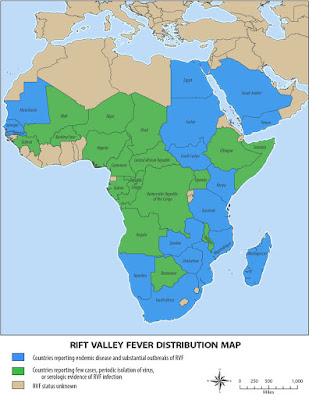 |
| Distribution of Rift valley fever virus via CDC. |
New research has discovered that Rift valley fever virus(*more on this virus below) may be a risk factor for miscarriages. In a cross-sectional study of 130 pregnant women with fever in Sudan, it was found that 28 were infected with Rift valley fever virus and 31 with Chikungunya virus (also mosquito transmitted). In the women infected with Rift valley fever virus, 54% had a miscarriage compared to 12% in those not infected; this represents a 7-fold increase in miscarriage associated with the virus. Infection with Chikungunya virus did not result in a statistically significant increase in miscarriage, though the symptoms of this virus are quite unpleasant. The study does have some limitations, such as the smaller size, but these factors are hard to improve based on the system they are working with (it's not exactly ethical to infect large numbers of pregnant women with a virus to see if it causes miscarriages). However, this study does highlight how essential it is to try and prevent mosquito bites during pregnancy as there are several viruses of concern for pregnant women (such as Zika).
*Rift valley fever virus is a mosquito-transmitted virus in the genus Phlebovirus in the Bunyaviridae. It normally infects cattle and other domesticated animals, but also can be transmitted to humans, though this isn't as common; contact with infected animals is a known risk factor for this virus. The disease is normally mild, but in some cases, it can cause severe disease (1-3%). It is transmitted by Aedes species mosquitoes that also maintain the virus through vertical transmission (eggs are infected by the virus if the female mosquito is infected) but other mosquitoes can transmit the virus mechanically. The distribution is limited to Africa and the Middle East, but with the warming climate, researchers are worried that it could spread to new areas (as Aedes species mosquitoes like A. aegypti and A. albopictus are expanding their range) and one of the vector species is common in Europe.